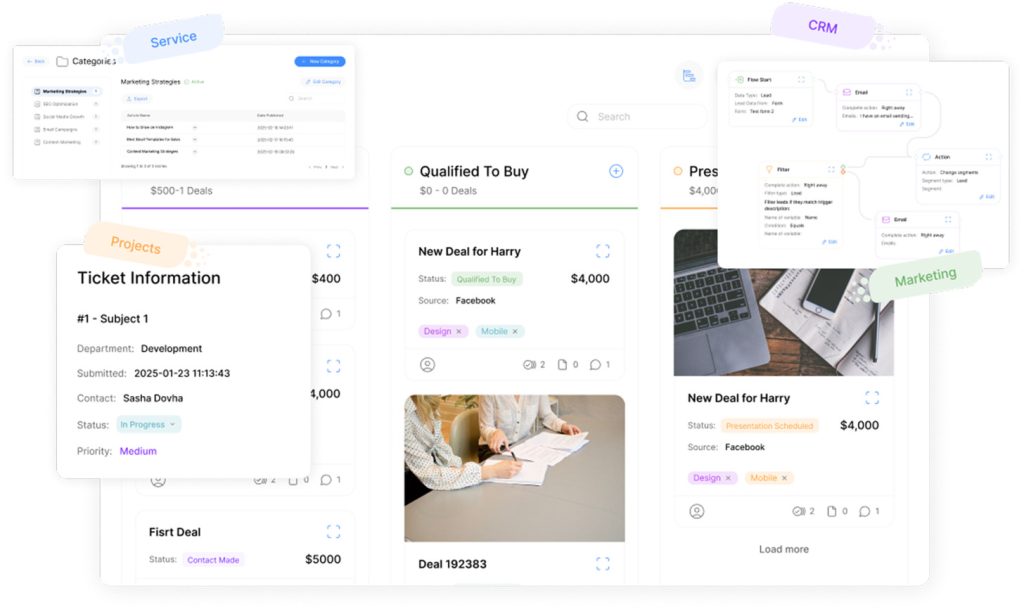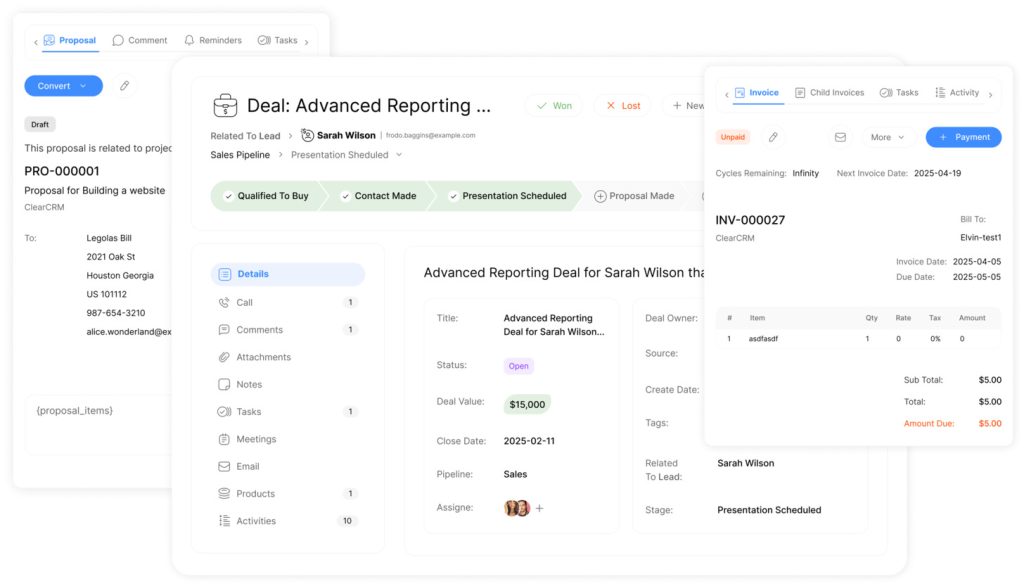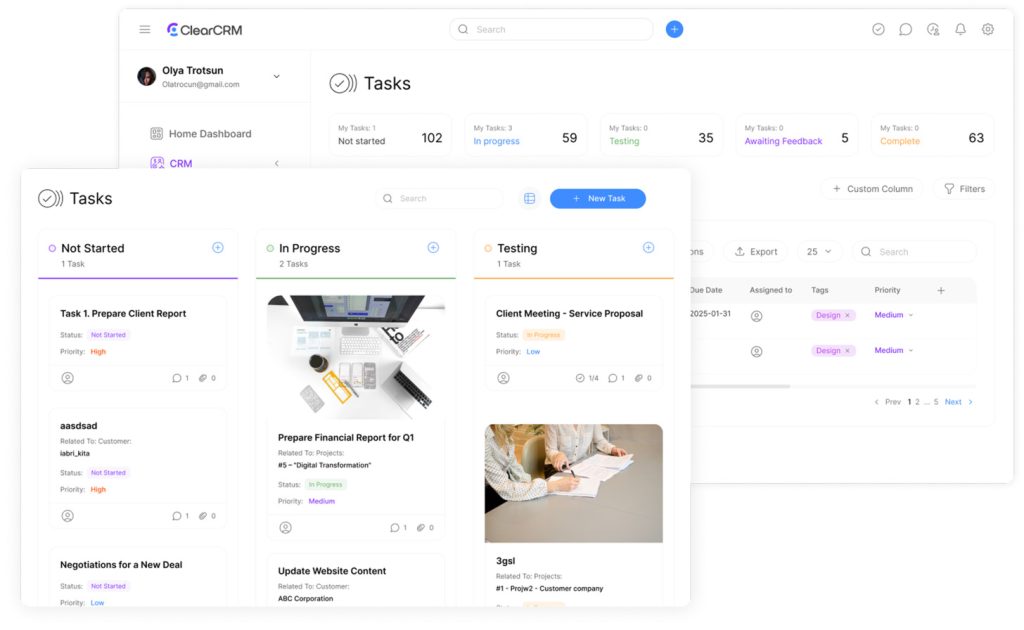Streamline Your Small Business with a Free CRM

Are you tired of juggling multiple software systems to manage your customer data? Do you struggle to keep track of client interactions and sales processes?
A customer relationship management system can be a game-changer for small businesses. It helps organize customer data, streamline sales processes, and improve overall efficiency. With a single platform, you can track client interactions, manage sales pipelines, and automate routine tasks to save valuable time.
By implementing the right CRM software, small businesses can compete more effectively with larger companies by delivering personalized customer experiences and maintaining organized data systems.
Key Takeaways
- Efficiently manage customer data with a centralized platform.
- Streamline sales processes and improve overall efficiency.
- Automate routine tasks to save valuable time.
- Deliver personalized customer experiences.
- Maintain organized data systems to compete with larger companies.
Understanding CRM and Its Importance for Small Businesses

In today’s competitive business landscape, understanding the role of CRM is crucial for small businesses. A significant percentage of companies with 10 or more employees use CRM software, highlighting its importance in managing customer relationships effectively.
What is a CRM System?
A CRM (Customer Relationship Management) system is a tool that helps businesses manage customer interactions and data throughout the customer lifecycle. It collects, organizes, and manages information to enhance the customer journey and experience. By using a CRM, small businesses can automate follow-ups, track customer data, and analyze customer behavior, making it easier to identify hot and cold leads and understand where to focus their efforts. Additionally, CRM tools for effective sales enable businesses to streamline their sales processes, allowing teams to collaborate more efficiently. These tools often come with features such as lead scoring and custom reporting, which provide valuable insights into sales performance and customer preferences. As a result, companies can tailor their strategies to better meet customer needs and drive revenue growth. Additionally, several CRM solutions for the restaurant industry have been developed to cater specifically to the unique needs of food service businesses. These systems allow restaurant owners to streamline reservations, manage customer feedback, and tailor marketing campaigns based on dining preferences. Ultimately, this targeted approach can significantly boost customer loyalty and increase repeat visits. Furthermore, tailored CRM solutions for media industry can help businesses streamline their outreach and engagement strategies, ensuring that content reaches the right audience at the right time. These systems also provide valuable insights into audience preferences, enabling companies to create more targeted marketing campaigns. Ultimately, adopting a robust CRM can significantly improve customer retention and boost overall profitability.
With a CRM system, businesses can ensure consistent communication with their customers, improving overall customer satisfaction and loyalty.
Why Small Businesses Need CRM Software
Small businesses face unique challenges in managing customer relationships, often with limited staff who must wear multiple hats. A free CRM system provides these businesses with the tools to compete with larger companies by organizing customer data and automating tasks. According to industry research, 91% of companies with 10+ employees use CRM software, underscoring its critical importance for business operations and growth.
By implementing CRM software, small businesses can report significant improvements in sales efficiency, with better lead conversion rates and increased customer retention. Even with limited resources, small businesses can leverage free CRM tools to create more structured sales processes and make data-driven decisions about customer engagement strategies.
Benefits of Using Free CRM for Small Businesses
Free CRM solutions provide small businesses with the necessary tools to optimize sales processes, enhance customer relationships, and improve overall management. By leveraging these systems, small businesses can streamline their operations, making them more efficient and competitive.
Improved Customer Relationships
Free CRM tools enable small businesses to foster stronger customer relationships by organizing customer interactions and data in one place. This centralized management system allows businesses to track customer preferences, history, and communications, ensuring personalized service and timely follow-ups. As a result, customer satisfaction and loyalty improve, driving long-term growth.
Enhanced Team Collaboration
A free CRM promotes automation and collaboration within teams by providing a shared platform for sales, marketing, and customer service activities. Team members can access real-time data, track progress, and coordinate tasks more effectively. This enhanced collaboration ensures that all team members are aligned and working towards common goals, improving overall productivity.
Streamlined Data Management
Free CRM systems simplify data management by automating data entry and providing a single source of truth for customer information. This not only reduces administrative burdens but also minimizes errors associated with manual data handling. With accurate and up-to-date data, businesses can make informed decisions and respond quickly to customer needs.
Increased Sales Efficiency
By utilizing free CRM tools, small businesses can significantly enhance their sales efficiency. These systems organize leads, opportunities, and deals in visual pipelines, allowing sales teams to focus on high-value activities like closing deals rather than managing data. Additionally, automation features handle routine tasks, freeing up sales representatives to build stronger customer relationships.
| Benefits | Description | Impact |
|---|---|---|
| Improved Customer Relationships | Centralized customer data and interaction tracking | Enhanced customer satisfaction and loyalty |
| Enhanced Team Collaboration | Shared platform for sales, marketing, and customer service | Increased productivity and alignment |
| Streamlined Data Management | Automated data entry and single source of truth | Reduced administrative burdens and errors |
| Increased Sales Efficiency | Organized sales pipelines and automation of routine tasks | Improved sales performance and customer relationships |
“CRM is not just a tool, it’s a strategy to build long-term relationships with customers.”
Essential Features to Look for in Free CRM Software
To maximize the benefits of a free CRM, businesses must focus on the essential features that drive success. A well-chosen CRM can streamline operations, enhance customer relationships, and boost sales efficiency.
Contact Management Capabilities

Effective contact management is at the heart of any CRM system. Look for a free CRM that offers robust contact management capabilities, including the ability to store detailed contact information, track interactions, and segment contacts based on various criteria. This feature is crucial for maintaining organized and accessible customer data.
Sales Pipeline Visualization
A good free CRM should provide sales pipeline visualization tools, allowing you to track the progress of deals through various stages. This feature helps in identifying bottlenecks, forecasting sales, and making informed decisions to drive revenue growth. Visualizing your sales pipeline can significantly enhance sales efficiency and team performance.

Task Management and Automation
Task management and automation are vital for optimizing workflow and reducing manual tasks. A free CRM with task management capabilities enables you to assign tasks, set reminders, and automate routine processes. This not only saves time but also ensures that important tasks are not overlooked, improving overall productivity.

Integration Options
When choosing a free CRM, consider its integration options. The ability to integrate with other business tools and platforms is crucial for creating a seamless workflow. Look for a CRM that offers integrations with popular email platforms, calendar applications, and marketing software. For instance, a CRM that integrates with your email marketing software can enhance your campaign management capabilities. You can explore more about CRM integrations on ClearCRM.
| Feature | Description | Importance |
|---|---|---|
| Contact Management | Organizes customer data and interactions | High |
| Sales Pipeline Visualization | Tracks deal progress and forecasts sales | High |
| Task Management and Automation | Streamlines workflow and reduces manual tasks | Medium |
| Integration Options | Connects with other business tools and platforms | High |
HubSpot: Comprehensive Free CRM with Marketing Tools
With its comprehensive marketing tools, HubSpot’s free CRM is particularly beneficial for small businesses looking to enhance their marketing efforts. This platform bridges the gap between marketing activities and sales processes more effectively than most free alternatives.
Key Features and Limitations
HubSpot’s free CRM offers a range of features, including contact management, sales pipeline visualization, task management, and integration options with Outlook, Gmail, Messenger, and the App Marketplace. Companies with service teams can benefit from ticketing service tools like email scheduling and ticket closed reports. Key features include sales documents, in-app calling with VoIP, email tools, community support, and HubSpot Academy.
Best For: Marketing-Focused Small Businesses
HubSpot’s free CRM is particularly valuable for small businesses with a strong marketing focus. The platform excels for businesses that prioritize content marketing and inbound lead generation, with tools for creating landing pages, blog content, and lead capture forms all connected to the CRM database.
- Small businesses that rely heavily on email marketing will benefit from HubSpot’s email creation tools, basic automation capabilities, and performance analytics.
- The sales tools, including deal tracking, task management, and prospect activity monitoring, make HubSpot suitable for businesses with defined sales processes.
- HubSpot Academy provides extensive free training resources, making this CRM an excellent choice for businesses that want to gradually build their CRM expertise.
By leveraging HubSpot’s free CRM, small businesses can streamline their sales and marketing processes, enhancing overall efficiency and customer relationships.
Mailchimp: Best Free CRM for E-commerce Businesses
Mailchimp’s free CRM is a top choice for e-commerce businesses looking to streamline their customer relationships. The platform is simple and easy to use, creating a seamless experience for internal users to transition into a new platform. Users can input and organize information quickly, cutting down on time while creating new opportunities for engagement.
Key Features and Limitations
Mailchimp’s free CRM offers several key features that make it ideal for e-commerce businesses. These include contact management, sales pipeline visualization, and task automation. While there are limitations to the free version, it provides a robust set of tools for managing customer data and email marketing efforts.
Best For: E-commerce and Email Marketing
Mailchimp’s free CRM is best suited for e-commerce businesses that prioritize email marketing as their primary customer communication and sales channel. The platform excels for businesses selling products online who need to:
- Segment customers based on purchase behavior
- Send targeted product recommendations
- Automate post-purchase follow-ups
- Benefit from e-commerce-specific features like product recommendations and revenue attribution reporting
- Use the intuitive drag-and-drop email builder and pre-designed templates to create professional marketing materials
With Mailchimp’s mobile app access, e-commerce entrepreneurs can monitor campaign performance, send broadcasts, and manage customer data while on the go, making it suitable for businesses without dedicated office space.
Freshsales: User-Friendly CRM for Small Teams
With its intuitive interface and robust sales features, Freshsales is an ideal CRM for small teams aiming to streamline their sales processes. Freshsales offers a free CRM that is designed to be user-friendly, making it accessible to teams without extensive technical expertise.
Key Features and Limitations
Freshsales’ free CRM software includes several key features that enhance sales team productivity. These features include conversation threads, a chat widget, and various website integration forms. The platform also offers role-based access and 24/5 customer support via multiple channels, ensuring that teams can get assistance when needed.
Some of the notable features of Freshsales include:
- Built-in phone capabilities for call logging and recording
- Mobile app for field sales teams to update deal information and log activities
- Account-centric approach for organizing contacts by company
Best For: Sales-Focused Small Teams
Freshsales is particularly well-suited for small sales teams that need a straightforward CRM to track leads, manage deals, and coordinate follow-up activities. The platform’s features are designed to support sales efficiency without overwhelming the team with complex functionalities.
The CRM small businesses benefit from Freshsales include:
- Enhanced sales productivity through streamlined processes
- Improved customer relationships through better contact management
- Accessibility on iOS and Android devices for field sales teams
Zoho CRM: Scalable Solution for Growing Businesses
Zoho CRM stands out as a versatile and scalable CRM solution tailored for businesses on the growth trajectory. It offers a comprehensive suite of tools designed to streamline sales, marketing, and customer service processes.
Key Features and Limitations
Zoho CRM is equipped with a range of features that cater to the diverse needs of growing businesses. These include contact management, sales pipeline visualization, task management, and automation capabilities. Collaborators can utilize calendars, direct messaging, status updates, file attachments, and website visitor tracking to enhance team collaboration. The platform also includes web-to-lead and contact forms, access to a knowledge base, a community forum, and available email and phone support. Additionally, Zoho CRM is available on both iOS and Android, ensuring seamless integration across devices.
Key Features:
- Multi-currency support and multiple language options for international operations
- Customization capabilities without requiring coding knowledge
- A marketplace of extensions and integrations with third-party applications
Best For: Businesses Looking to Scale
Zoho CRM is ideally suited for growing businesses that need a free starting point with a clear upgrade path as their requirements become more sophisticated. The platform’s integration with other Zoho applications creates a comprehensive business ecosystem that can expand as the company grows. Small businesses with international operations benefit from Zoho’s global compliance features and multi-currency support. The customization capabilities allow businesses to adapt the CRM to industry-specific needs, making it suitable for specialized business models.
Monday CRM: Visual Pipeline Management
Monday CRM offers a visual approach to pipeline management, making it an ideal choice for teams that prefer a more intuitive interface. This CRM software is designed to help businesses manage their sales processes more effectively, providing a clear visual representation of the sales pipeline.
The platform’s visual nature makes it particularly effective for teams that struggle with traditional list-based or form-heavy CRM interfaces. By providing a clear and customizable board layout, Monday CRM enables teams to manage their sales processes with ease.
Key Features and Limitations
Monday CRM features over 100 app integrations, including e-signature tools and business phone systems. It offers key CRM benefits by automatically notifying sales reps when an email is opened or assigning newly qualified leads to a team member. Some of the key features include:
- Visual pipeline management
- Customizable boards
- Automated workflows
- Integration with popular business apps
While Monday CRM offers many benefits, it’s essential to consider its limitations. For instance, some users may find the customization options overwhelming, and the platform may require some time to get used to.
Best For: Visual-Oriented Teams
Monday CRM is particularly suited for teams that prefer visual workflow management. The platform excels for businesses with collaborative sales processes where multiple team members contribute to deals and need clear visibility into each other’s activities. Some of the businesses that can benefit from Monday CRM include:
- Creative businesses and agencies
- Teams transitioning from kanban-style project management tools
- Businesses with unique sales processes that don’t fit neatly into the standard CRM pipeline model
For more information on how CRM can enhance customer management, check out our article on how ClearCRM enhances customer management.
How to Choose the Right Free CRM for Your Small Business

With numerous free CRM options available, choosing the right one for your small business requires careful consideration of several key factors. A well-suited CRM can significantly enhance your customer relationships and streamline your operations.
Assessing Your Business Needs
Begin by evaluating your business requirements. Consider the size of your team, the complexity of your sales process, and the specific features you need. A flexible and user-friendly CRM is crucial for efficient operations. Think about the type of customer data you need to manage and the level of support you require.
Evaluating User Experience and Learning Curve
The chosen CRM should be easy to use and require minimal training. A steep learning curve can lead to decreased adoption rates among your team members. Look for a CRM with an intuitive interface that simplifies your workflow. Consider the availability of customer support and training resources.
Considering Future Growth and Scalability
When selecting a free CRM, it’s essential to consider your business’s future growth. Evaluate the CRM’s scalability, including its ability to handle increased data and user demands. Key considerations include:
- Data limitations in free plans, such as contact storage caps or record restrictions.
- The platform’s API and integration capabilities to ensure compatibility with future business systems.
- Scalability in user management, including role-based permissions and team structures.
- The CRM’s track record for innovation and updates to ensure it remains relevant.
By carefully assessing these factors, you can choose a free CRM that not only meets your current needs but also supports your business’s future growth.
Implementing Your Free CRM: Best Practices
To get the most out of a free CRM, small businesses must focus on effective implementation strategies. Integrating a free CRM into your business operations can be a powerful solution to enhance customer relationships and streamline data management.
Data Migration and Setup Tips
Successful data migration is crucial for a seamless CRM implementation. Start by cleansing your existing data to remove duplicates and outdated information. Then, map out your data fields to ensure a smooth transition into the new CRM. Configure the system to reflect your business processes, and set up custom fields and tags to capture relevant data.
Training Your Team Effectively
Effective training is key to CRM adoption. Begin with comprehensive training sessions that cover all aspects of the CRM, from basic navigation to advanced features. Use real-life scenarios to demonstrate how the CRM can solve specific business challenges. Provide ongoing support and resources to help your team become proficient in using the CRM.
Maximizing CRM Adoption
To maximize CRM adoption, consider the following strategies:
- Lead by example: Management should consistently use the CRM for their activities.
- Connect CRM usage to business outcomes, such as improved customer relationships and increased revenue.
- Create accountability through regular reviews of CRM adoption metrics.
| Strategy | Description | Benefit |
|---|---|---|
| Lead by Example | Management uses CRM consistently | Increased team adoption |
| Connect to Outcomes | Link CRM usage to business results | Improved customer relationships |
| Create Accountability | Regular reviews of CRM adoption | Enhanced team performance |
Conclusion: Transforming Your Small Business with Free CRM
The right free CRM software is a game-changer for small businesses, enabling them to compete with larger organizations effectively. By adopting a free CRM solution, businesses can professionalize their customer relationship management practices.
Implementing a free CRM represents one of the most cost-effective ways for small businesses to enhance customer satisfaction and drive growth. The CRM platform transforms scattered customer data into actionable insights through organized contact records, interaction tracking, and customizable reports and dashboards.
Key benefits of using a free CRM include:
- Enhanced customer experiences through personalized interactions
- Improved team collaboration and data management
- Structured sales processes and data-driven decision making
As your business grows, the experience and data gathered using a free CRM will prove invaluable when transitioning to more advanced management solutions. Mailchimp’s all-in-one marketing platform offers a robust CRM software that can help you market smarter without working harder. Try our CRM feature for your small business today.

